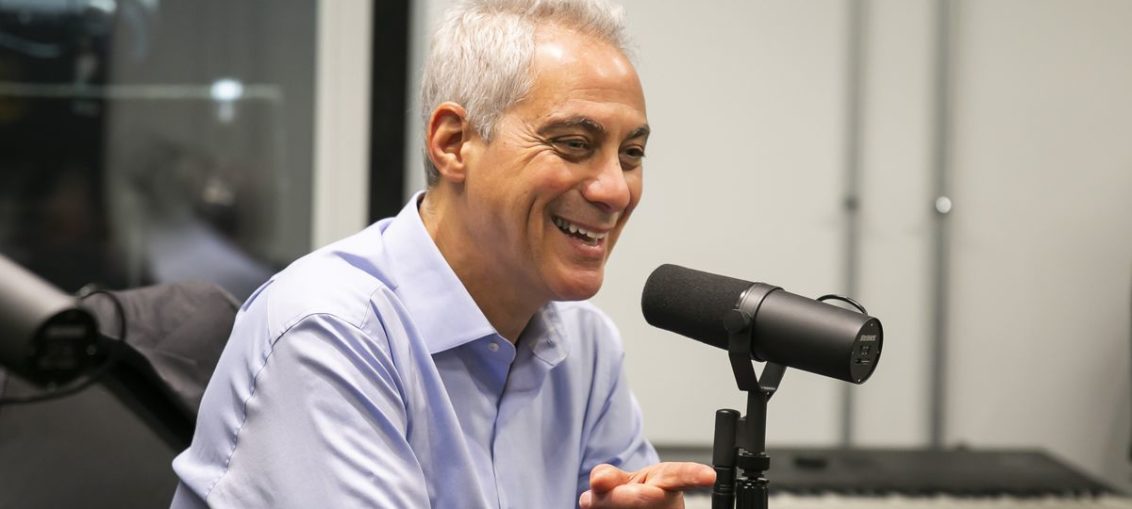
The burgeoning corruption scandal that has unfold from Chicago and the south suburbs to Springfield provides Gov. J.B. Pritzker a uncommon probability to implement ethics reforms that may have been unthinkable in any other case, former Mayor Rahm Emanuel stated Friday.
“As somebody once said, and really crystallized it, `Never allow a good crisis to go to waste.’”
Emanuel was quoting himself.
“I remember the auto industry. We finally in that moment of crisis did things that people had been talking about for 30 or 40 years. … We [now] have a crisis. And now, you’re gonna have to do things that you’ve discussed and thought about before, but for a host of reasons” may by no means do.
Six months after leaving workplace, Emanuel sat down with the Sun-Times for an prolonged interview below strict floor guidelines.
He wouldn’t go judgment on something Mayor Lori Lightfoot has performed. Not on her $11.6 billion price range or her relationships with a City Council that has been pushing again. Not on the 11-day lecturers strike or her strained relationship with the Fraternal Order of Police.
Everything about Lightfoot was off-limits. That’s Emanuel’s political ethic.
“I love this city. I love the future of this city. But, I will never, ever, having sat in that chair [pass judgment]. All I would say is, I root for her and root for the city,” he stated.
“I had the ethic in office. You didn’t say anything about our predecessor. And I have that ethic also [about his successor]. I know what the job takes. It’s very hard. You don’t need to make it harder. … In a note [left for Lightfoot], all I would say is, `I’m rootin’ for ya.’ My view is, a mayor needs to have all the running room they need to do the job.”
Instead of specializing in Lightfoot and City Hall, Emanuel talked extensively about state politics and the extraordinary alternative his buddy Pritzker now has to wash issues up as increasingly proof surfaces about an investigation that features Commonwealth Edison lobbyists and seems to be concentrating on Illinois House Speaker Michael Madigan (D-Chicago).
“If you had a career politician in the governor’s office, they would trim their sails. Governor Pritzker is not part of this. He comes to it fresh, clean. He has no kind of history. All the things that you thought hit the bumper — [saying], `You can’t get that done for this reason’ — he has no history with it. No relationship to it. That allows him to get something done,” Emanuel stated.
“Getting this done is key, given what’s hanging over the state. At the same time, it comes with what other things can’t get done because so much energy is around this.”
Pritzker’s prime precedence is to go the constitutional modification he wants in November to implement a graduated earnings tax.
Emanuel stated he expects the modification to go in November 2020 — in all probability after it’s tied to a property tax freeze or another type of property tax aid.
He credited Pritzker with hitting a “grand slam” through the spring session by profitable approval of a large capital invoice, on line casino playing and leisure marijuana.
The momentum continued through the veto session, when Pritzker satisfied the General Assembly to consolidate suburban and downstate police and hearth pensions.
“I had to deal with Governor Rauner, who has his views of the city of Chicago. And it was hand-to-hand combat for four years. … You [also] know the working relationship I did and did not have with Governor [Pat] Quinn,” Emanuel stated.
“You [now] have a governor who is looking to the future and not trying to settle scores, but get moving.”
Emanuel stated the upcoming retirement of his shut buddy and political ally, Illinois Senate President John Cullerton (D-Chicago), shall be an enormous loss to Chicago.
“The state, for the primary time in 100 years, is now paying a portion of the lecturers’ pension [thanks to] John Cullerton. … And it goes up. Re-writing the varsity financing invoice main…